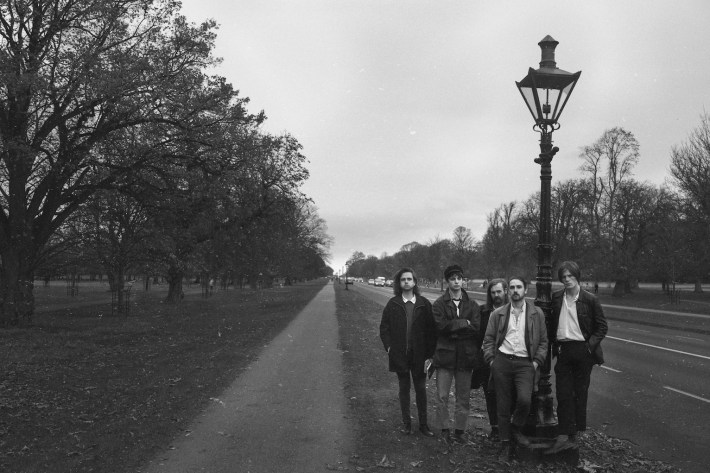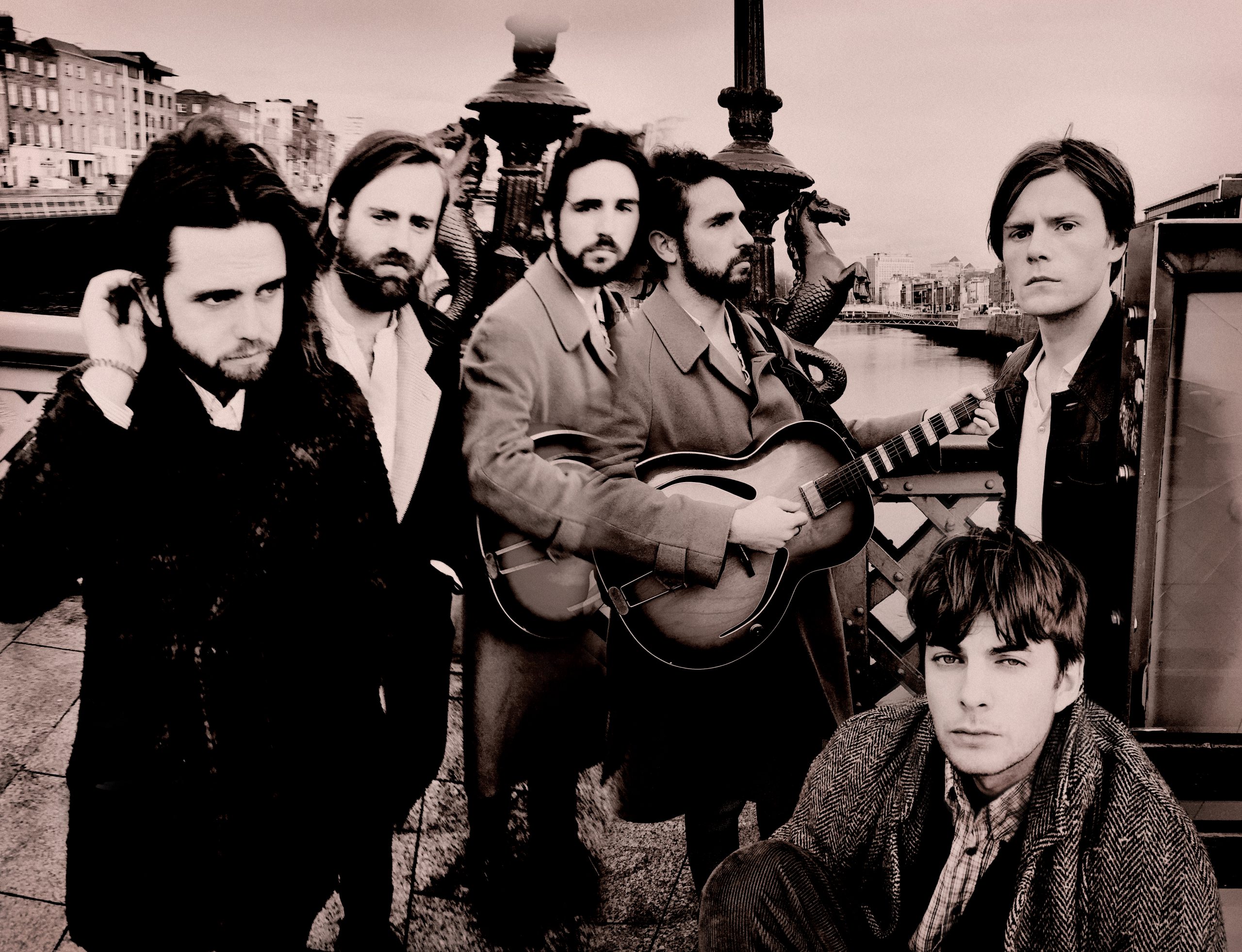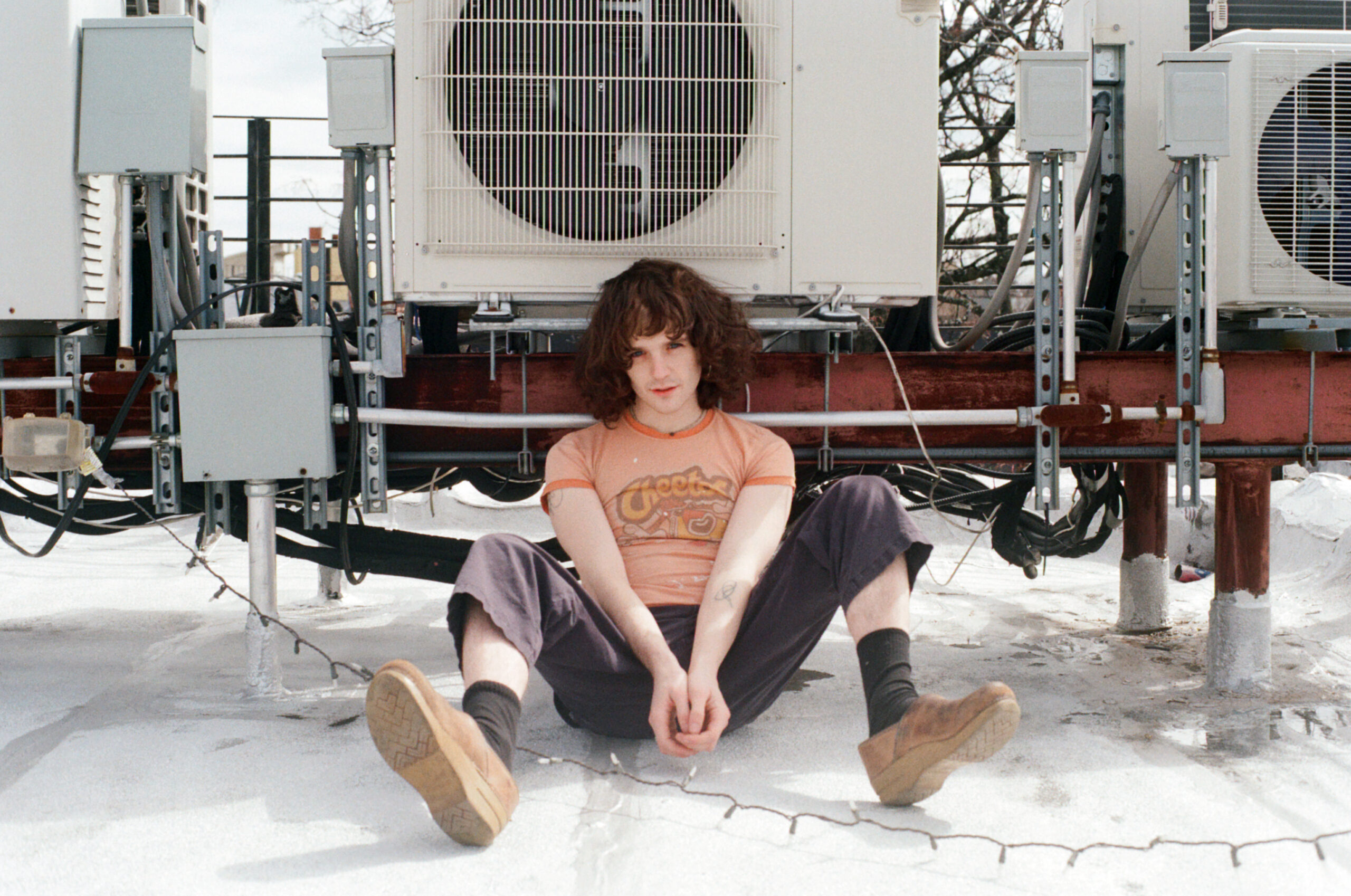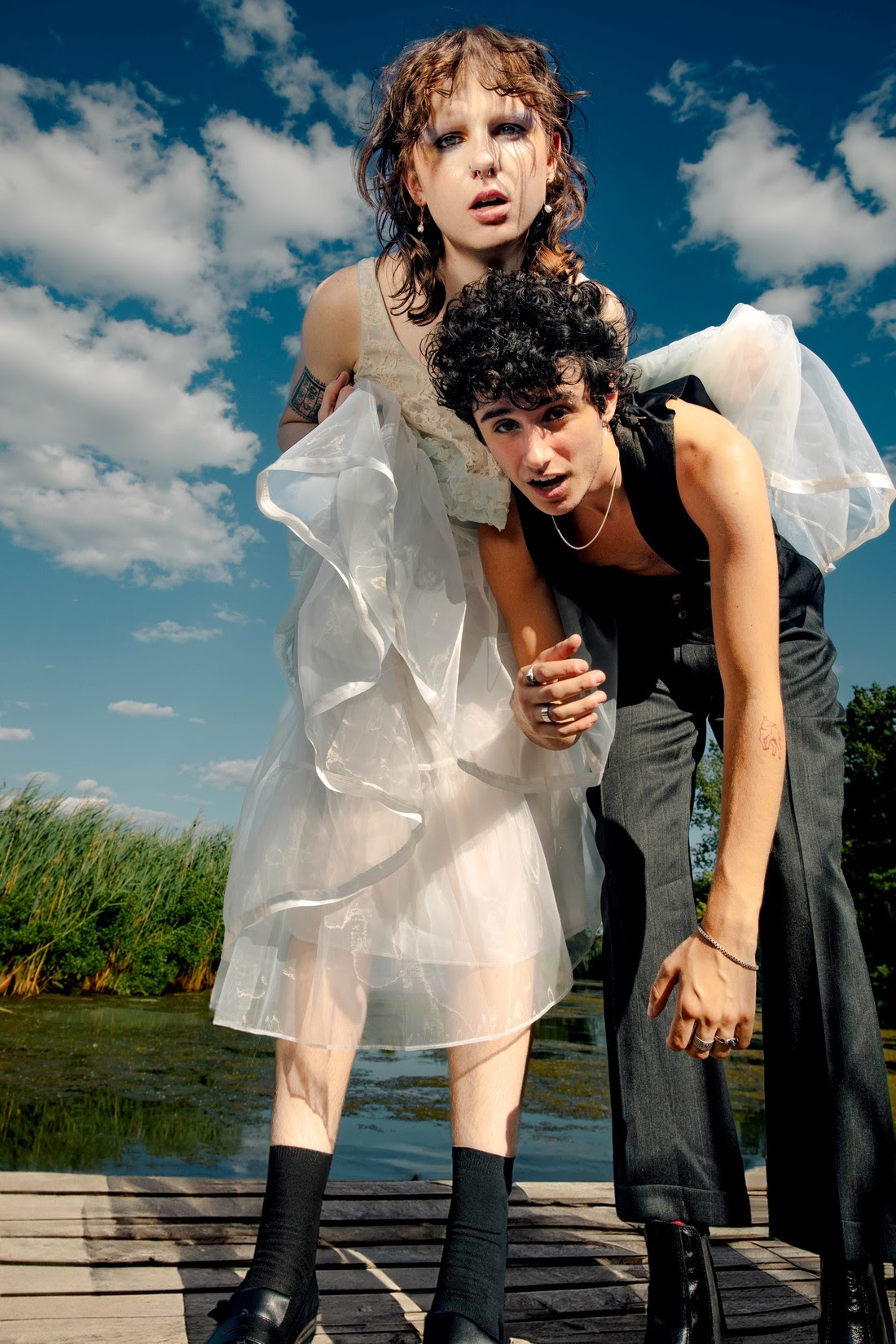There's been something happening in Dublin. Across 2014 and 2015, a group called Girl Band started to generate international buzz thanks to their idiosyncratic blend of noise-rock, post-punk, and techno-inspired rhythms. Here was a new sound, one nobody associated with a specific generation or scene in Ireland. Girl Band then went silent for several years, and became something like lost progenitors of a nascent subculture in Dublin’s music scene. In their wake, a crop of young bands have started to appear, creating a small pocket of what could loosely be deemed a contemporary, local breed of post-punk in a Dublin otherwise characterized by the ever-present glut of singer-songwriter types and the rise of homegrown R&B and electronic. Within it, there are permutations: the infectious punk-laced indie rock of Silverbacks, the new wave textures and krautrock rhythms of MELTS, the Idles/Shame-isms of the Murder Capital, the aggressive shoegaze of Just Mustard. Of those bands, the group that sits at the front of the pack, the ones who have ignited their own buzz in Ireland and the UK, are Fontaines D.C.
The first time I came across Fontaines D.C. was in September of 2017, at a Dublin event known as Hard Working Class Heroes -- a sort of mini-SXSW, in which the conference takes over several venues around town for the weekend with showcases aimed at exposing emerging Irish talent. Even then, not even half a year on from their debut single, Fontaines D.C. drew attention. They were the band people were telling you that you couldn't miss, and those people were right. All in their early 20s, Fontaines played a set that was swaggering yet sardonic, with the energy of a band that knows they have something but at the same time aren’t too bothered to prove it to you. There was something Strokes-esque about it -- especially in frontman Grian Chatten’s DGAF cool -- just rougher around the edges and not as rigid, as if accounting for coming from Dublin’s streets rather than Manhattan’s. Most importantly, they had the air of stars in the making.
Now, a little over a year later, I cross paths with Fontaines again -- this time in Reykjavik, during Iceland Airwaves, where they are again one of the talked-about sets and where they prove that they’ve become an even more formidable live band. It is November 2018. They perform at Gaukurinn, a dive-y, low-ceilinged rock club that has the stale smell of countless nights out ingrained in its walls, a permanent air of spilled alcohol and smoke drifting in from the back patio. It strikes one as the ideal sort of room for Fontaines to play in.
At this point, the band's been on a steadily building wave of hype, releasing several more singles through 2017 and 2018 and eventually signing an album deal with Partisan. They’re approaching a turning point, at which early promise could come into focus. Over the course of a couple nights around town, I get to know the band -- including, in addition to Chatten, guitarist Conor Curley, guitarist Carlos O’Connell, bassist Conor Deegan III, and drummer Tom Coll -- culminating in a meeting in the backyard of a bar with a complicated name none of us can pronounce as a chilly Icelandic night settles in. There, they tell me about the band’s origins, and what went into their forthcoming debut album.
The band seems to do almost everything as a unit, whether it’s interviews or checking out Reykjavik’s nightlife post-show. Huddled closely around a wooden picnic table, they have the vibe so few bands in the indie sphere boast today -- like these are five characters each inextricable from the identity of Fontaines, each voice as crucial as the other, complementing or balancing each other’s dispositions. Even so, Chatten is clearly the leader. He affects a different demeanor than his onstage presence: There is a commanding element to his performance style, almost always standing still at the mic yet barking and drawling his lyrics with a feverish intensity, bringing to mind a hungry young echo of certain Britpop frontmen of the past. In conversation, too, he is magnetic, but in a more casual way -- he speaks in a low, heavily-accented mumble, deeply earnest about ideas but not above a dry aside.
At the same same time, Chatten will grow tired of hearing himself talk and insist his bandmates take the lead. O'Connell speaks with a serene focus; Curley is often the one to matter-of-factly fill in details if his compatriots go too deep into musings. There's a way in which the band can communicate as one organism, not talking over each other but rapidly getting thoughts out that another person will instantly pick up and continue. You could be forgiven for mistaking them as lifelong, childhood friends who have grown up intertwined.
In reality, the five members of Fontaines D.C. met while attending music college in Dublin. (Though you'll soon discover they are a thoroughly-Dublin band after listening to particular songs, only Chatten originally hailed from the area, with Coll, Curley, and Deegan all coming from other parts of Ireland and O’Connell growing up in Spain.) As Chatten recalls, they began to notice each other in class discussions, and from there started going out for drinks and comparing notes on poetry. From the beginning, there's a sort of imagined old-school gang mentality to how Fontaines came about. "It was a bit conspiratorial at the start," Chatten describes.
An Old World sense of romance is a recurring topic with the band, whether they were drawing from it for their own work or whether they were cataloguing the loss of it. In their earliest days, they specifically bonded over Kerouac and other Beat writers -- the rush and exuberance of their writing lining up with Fontaines’ efforts to compose something and leave it as is, raw and exploratory. From there, they got into Yeats and Lorca; Coll turned his bandmates onto Joyce’s Dubliners. The roots of Fontaines D.C. were all literary more than musical, with the five of them dreaming of someday releasing a collaborative book of poetry.
Their moniker, too, conjures up decades past, but comes from a more mainstream touchstone. While "the Fontaines" might come across like a vintage ‘60s pop band, they grabbed the name from a character in The Godfather: Johnny Fontane, the crooner in the mold of Frank Sinatra. (Though originally billed simply as Fontaines, the band encountered some early legal challenges from a pre-existing LA band, prompting them to add the D.C. suffix -- standing for Dublin City, not District Of Columbia, in case there's any confusion.) "I liked the duplicity of his character and the fact that he would walk around like he was the son of fucking God, making women weep and stuff," Chatten grumbles wryly. "Contrasted with when he went through the Don's office, he was reduced to nothing and he was a mess looking for help. It was a bit of a joke at the start, we just wanted the idea that we were endorsed by the Mafia. That every step of our career was endorsed by some Don."
Fontaines D.C. take those reference points and weave them into a sound that's elicited plenty of comparisons to bands like the Pogues (for a wasted, unabashed reflection of Celtic culture), the Stooges (for their reckless abandon), the Strokes (for their punchy 21st century update of punk both post- and proto-), the Fall (mostly because of a talk-sing vocal approach), and Girl Band, the fellow Dubliners that Fontaines D.C. have looked up to for both their refusal to shy away from depicting where they're from and for their sonic adventurousness. The five singles Fontaines D.C. have released so far go in slightly different directions, but also feel unified under a sound that finds a synthesis between post-punk, garage rock, and a kind of gritty, urbane sense of rhythm and narrative.
First, there was "Liberty Belle," the rough-hewn garage-rocker of the bunch. The band started to draw more attention by the time its follow-up, "Hurricane Laughter," arrived later in 2017; driven by the kind of riff that feels as if it's lacerating the track around it, "Hurricane Laughter" was a propulsive, unshakeable track that drove Chatten to transition from bleak calm to frenzy in a matter of minutes. Early 2018 gave us the anthemic "Boys In The Better Land" and the churning manifesto "Chequeless Reckless." Finally, with an album on the horizon, they closed out last year with "Too Real," a discomfiting and confrontational single that, nevertheless, will get lodged in your head as emphatically as its predecessors.
All of those songs will appear on their full-length debut, due out later this year. (The already-released tracks were re-recorded to be more consistent with the album's tone, one that's immediate and unadorned in an attempt to reflect the band's live energy.) The album is called Dogrel, after a type of poetry once popular in Ireland. "It was like pub poetry," O'Connell explains. "Quite working class. We felt like that aspect of poetry, which was free verse and not high-brow -- that resonated with what we were doing, having the poetic influence but also being a rock 'n' roll band." It was, also, a term of derision, something a critic might've used to dismiss what they regarded as primitive poetry. (Or, as O'Connell puts it: "It's a piece of shit.") That, too, spoke to the nature of the music, its lingering dirtiness and Chatten's tendency to mix grand ideas with banalities uttered by some drunk in some Dublin bar.
"If you wanna learn about life through the eyes of a romantic cynic, go to any bar in Dublin," Chatten quips. In the past, he's already described Fontaines' lyrics as being influenced by "a combination of pub talk and poetry." "They're much the same really," he adds, "There's so much poetry innately in the colloquialisms of people in Ireland. You don't really have to strive to speak poetically if you're speaking in the Dublin lingo, you know? It's just impossible to live in that and not churn it out." And he's drawn to the characters offering those colloquialisms, the drunks philosophizing in a darkened corner of the pub late at night, the guy who thinks he's cracked the code of the world once he's several pints in. "I just think that's fucking beautiful," he says. "It's sad, but it's also kind of inspiring."
There's no mistaking the band's roots, even without those explanations. The songs on Dogrel are dominated by Irish references, most being very specific to place. "Liberty Belle" is a tribute to the Liberties, a part of town several of the band members have called home and that Chatten asserts is the last bastion of a true, fading strain of Irish identity. (The song predates GLOW, the Netflix series about women's wrestling featuring a character who performs as Liberty Belle.) One of the album's yet-to-be-released highlights -- a haunting track called "The Lotts" -- is named for an area (and a famously tiny pub) in Dublin; it's where the band used to practice, and they recall having to watch their every step outside to avoid all the syringes. The first lyric on the whole album, in opener "Big," is "Dublin in the rain is mine"; Dogrel's closing track is called "Dublin City Sky" and adopts an almost traditional Irish melody for its verses. The end result isn't so different from the material they were inspired by, books like Dubliners: snapshots of a city with all manner of culture and history and tragedy etched into its architecture.
The word "romance" gets thrown around a lot in a conversation with the Fontaines, and you could initially take Dogrel as an overflowing love letter to their home, even (or especially) when it's documenting more down-and-out circumstances of the town. But it's a conflicted, complicated relationship. "We began falling in love with Dublin at a strange time," Chatten explains. "I wasn't brought up to love Dublin and its culture, and we fell in love with it at a time when it's becoming extremely gentrified and the culture's on its last legs." They want the older, dwindling facets of Dublin to be remembered, and Chatten admits there might be some drive to preserve the past through their music, or at least to pay respects and process the loss of a Dublin they briefly knew. He adds, knowingly: "There's no more romantic time to fall in love with something than right before its death."
Consequently, you could hear certain songs on Dogrel and locate a different sentiment entirely. In that opener "Big," Chatten proclaims "My childhood was small/ But I'm gonna be big!" It's a lyric that, even when self-aware, is loaded with the kind of rock bluster of older generations, an exercise in myth-making dead-set on leaving their youth and hometown behind. In "Boys In The Better Land," you can almost recall something as pointed as Oasis' "Rock N' Roll Star" -- an opening salvo setting the stage for a person outgrowing their origins, with Chatten singing about getting a good car and getting out of here. While Chatten confesses there's probably a bit of himself mixed in with the characters of those songs, Fontaines also know what they're doing when they employ these tropes. "Boys In The Better Land," for example, is not just a runaway dream of escape, but it's also a doubting account of "erroneous misleading advice," grappling with a grass-is-greener perception Chatten saw in Ireland being sold abroad and other countries being sold to Ireland. "It's someone selling you a washing liquid on TV," he states bluntly.
Still, there are true pangs in the music Fontaines D.C. have made so far. This is a band that was born from Beat poetry and The Godfather and remnants of a fading Ireland. They are attracted to old things, but also can connect with the melancholy of losing those things further into the rearview, and there's a grandiosity to that history that the band is trying to tap into. For now, they are capturing that with a city-based vibrancy, scrappy songs rushing forward. The sound of a youth spent witnessing things disappear into the past, eager to capture them before they're intangible and eager to consume as much of the outside world as possible at the same time.
There's an intimacy and precision to the nature of Dogrel, an album born from a place and time in Dublin and in the lives of Fontaines D.C.'s five members. And as ambitious as they already are, you can hear bigger, even grander, attempts brewing in songs like "Boys In The Better Land" and "The Lotts." After all, everything goes back to that initial bond over Kerouac, a melancholic guy desperate to chase wonder in as many corners as he could. That's the lives these guys are starting to live, too, leaving Dublin and touring the world.
Naturally, they are inspired. A second Fontaines D.C. album is already taking shape, and it so far represents their changing lives. "I think I'm a little more optimistic sometimes when I'm on the road," Chatten says. "You see something that demands to be written about and you write about it, and a lot of the things we've seen that demand to be written about have been beautiful things." At this stage, Fontaines D.C. are already a captivating new artist, with a compelling way of bringing their home to everywhere else. Who knows what will happen when they start bringing the everywhere else back home.

Fontaines D.C. have also announced their first US tour, with a March show at Brooklyn's Union Pool (with Body Type) and then supporting Idles around the country at the end of the spring. Check out all the dates below:
03/07 - Brooklyn, NY @ Union Pool
05/05 - Raleigh, NC @ Kings Barcade (SOLD OUT)
05/06 - Richmond, VA @ The Broadberry
05/07 - Baltimore, MD @ Metro Gallery
05/08 - Albany, NY @ The Hollow
05/10 - Brooklyn, NY @ Brooklyn Steel
05/11 - Washington, DC @ Rock & Roll Hotel (SOLD OUT)
05/12 - Washington, DC @ Rock & Roll Hotel
05/14 - Cleveland, OH @ Beachland Ballroom
05/16 - Kansas City, MO @ recordBar
05/17 - Dallas, TX @ Curtain Club
05/18 - Austin, TX @ Barracuda
05/20 - Phoenix, AZ @ Valley Bar
05/21 - San Diego, CA @ Belly Up
05/22 - Los Angeles, CA @ The Fonda Theatre
05/25 - San Francisco, CA @ Great American Music Hall
05/27 - Portland, OR @ Wonder Ballroom
05/28 - Seattle, WA @ Neumo’s (SOLD OUT)






